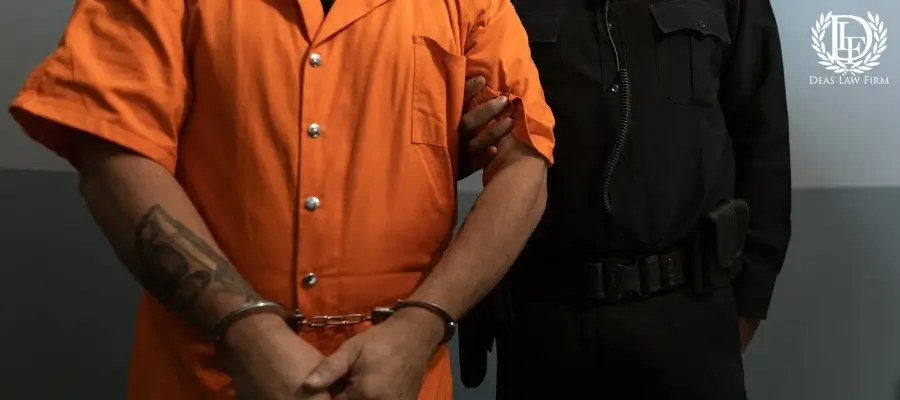|
|
Last Modified on Apr 29, 2025
Deas Law Firm knows that there is a range of types of criminal charges in South Carolina, and they all have a spectrum of severity. These charges can range from minor offenses like petty theft to more serious crimes such as murder or drug trafficking. The state classifies crimes into categories based on their seriousness, with felonies being the most severe and carrying the harshest penalties. Misdemeanors, while less serious, can still result in harsh penalties.
Understanding the types of criminal charges in South Carolina is crucial, as each comes with different consequences and legal processes. Whether you’re facing a minor charge or something more serious, it’s important to know what you’re up against.
Common Types of Felonies in SC
According to a report by the South Carolina Law Enforcement Division (SLED), violent crime decreased by 5.8% from 2022 to 2023, but these stats show that crimes are still very prevalent in the state. It is vital that you understand common types of felonies and misdemeanors as a resident or visitor. Felonies in South Carolina include some of the most serious criminal offenses, such as:
- Murder, for example, is one of the harshest crimes and involves the intentional killing of another person. Attempted murder, though the act was not completed, still carries severe consequences. There were approximately 495 murder offenses committed in South Carolina in 2023, a decrease from the previous three years.
- Armed robbery is another major felony. It involves using a weapon to take something by force. The SLED reported 2,185 robbery offenses in 2023, a decrease for the seventh year in a row.
- Drug trafficking is also common, especially with substances like cocaine or fentanyl.
- Burglary is another frequent felony, where someone unlawfully enters a building to commit a crime.
- Sexual assault offenses can vary in degree depending on the act.
- Felony-level domestic violence cases involve serious injury or weapons.
These charges often carry long prison terms and can have lasting impacts on an individual’s life and record.
Common Types of Misdemeanors in SC
Misdemeanors are less serious than felonies but can still lead to jail time, fines, and a permanent criminal record. One of the most common misdemeanor charges in South Carolina is simple possession of marijuana or other controlled substances. While these charges may seem minor, they can still carry serious consequences, especially for repeat offenders.
Another frequent misdemeanor is driving under the influence (DUI). Even a first offense can lead to license suspension, mandatory education programs, or time in jail. Public disorder offenses like disorderly conduct, public intoxication, and disturbing the peace are also typical misdemeanors seen in local courts.
Assault and battery in the third degree, often tied to fights or minor altercations, is considered a misdemeanor unless more serious injury is involved. Shoplifting is another common charge, especially when the value of the stolen item is relatively low.
While misdemeanors generally carry lighter penalties than felonies, they should still be taken seriously. They can affect employment, housing, and future legal outcomes. In many cases, first-time offenders may be eligible for diversion programs or reduced penalties, but having a clear understanding of the charge is key to moving forward wisely.
Whether a felony or misdemeanor, any criminal charge can change the course of your life. The labels may differ, but both carry real consequences that can affect your freedom, reputation, and opportunities.
FAQs
Q: What Are the Most Serious Offenses in South Carolina?
A: In South Carolina, some of the most serious offenses include murder, armed robbery, and drug trafficking. These crimes carry severe penalties, such as long prison sentences or even the death penalty for murder in certain cases. Other serious offenses include sexual assault, kidnapping, and aggravated assault. Violent crimes and those involving large amounts of drugs or weapons tend to carry the harshest consequences.
Q: What Is a Common Criminal Charge?
A: A common criminal charge is theft, which involves taking someone else’s property without permission. This can range from shoplifting to burglary. Another frequent charge is driving under the influence (DUI), which happens when someone operates a vehicle while impaired by alcohol or drugs. Other common charges include assault, drug possession, or vandalism. While these charges can vary in severity, each can lead to serious consequences like fines and jail time.
Q: What Is Considered a Felony Offense?
A: Crimes that are considered felony offenses can include murder, robbery, drug trafficking, and aggravated assault. These offenses usually result in longer prison sentences, often more than one year, and can lead to substantial fines and probation. Felonies can also have lasting effects, such as losing the right to vote or own firearms.
Q: Can a Criminal Defense Lawyer Help My Case?
A: Yes, a criminal defense lawyer can significantly help your case. They understand the law and know how to challenge evidence, negotiate with prosecutors, and build a strong defense. A lawyer can protect your rights, ensure fair treatment, and guide you through each step of the legal process. They can work to reduce charges, seek a lighter sentence, or even get the case dismissed. Having legal representation can increase your chance of a positive outcome.
Q: How Long Do Most Criminal Cases Take?
A: The length of a criminal case can vary depending on its complexity. Simple cases may be resolved quickly, often in a few weeks or months. More serious or complex cases, especially those involving multiple charges or victims, can take much longer. If a case goes to trial, it may take several months or even years to reach a conclusion. Delays can occur due to scheduling, evidence gathering, or negotiations.
Speak With a Trusted Criminal Defense Attorney Today
Understanding the different types of criminal charges in South Carolina can help you make sense of what you or someone you know might be facing. From misdemeanors to felonies, each charge carries its own set of challenges and potential outcomes. Knowing how the legal system classifies and handles these offenses is an important first step in protecting your future.
If you’re dealing with a criminal charge or simply have questions about your situation, don’t hesitate to get help. Schedule an initial consultation with a trusted criminal defense lawyer from Deas Law Firm to discuss your options and start building a strong defense.






